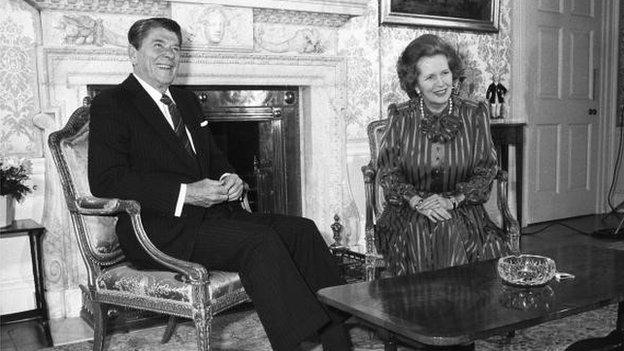And then Ron said to Maggie
- Published
- comments
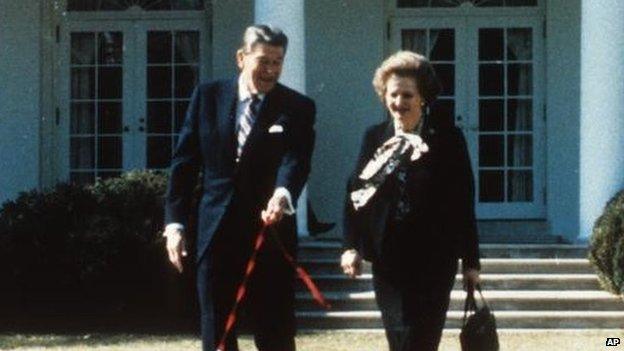
Newly released recordings of Ronald Reagan apologising to Margaret Thatcher over Grenada in 1983 tell us less about the Cold War and more about their unique relationship.
Oh what joy, what perfection. The conversation between them is just delicious, as much for what is said as what can be intuited.
We have these two kindred spirits, ideological spear carriers in the fight against the evil empire - Ronald Reagan's term for the Soviet Union - having a bit of a problem in their relationship.
I was just coming out of journalism college when this conversation took place.
Listen to the Ronald Reagan apology
Hugely popular at the time was a poster parodying the film Gone With the Wind - it depicted Maggie Thatcher in Reagan's arms - and the idea behind this liberal/left poster was that we were all going to be gone with the wind because of a nuclear winter brought about by these warmongers.
This conversation is not about the Soviet Union - well, not directly. The problem is that America has just invaded an independent member of the British Commonwealth.
Not only that, the invasion has taken place without the US giving any kind of warning to Her Majesty's Britannic government. Maggie, the Iron Lady, totally blindsided by her friend Ron.
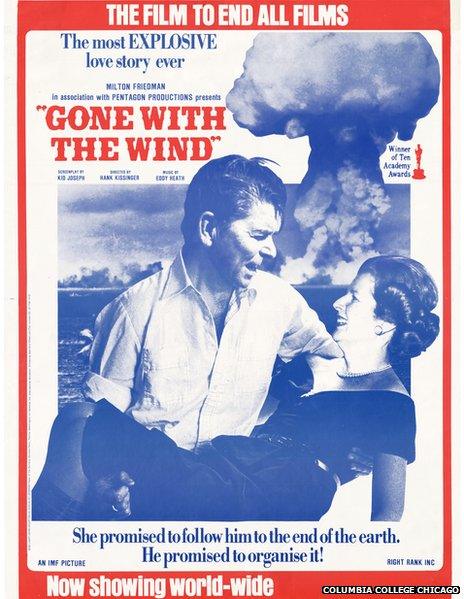
Before we get back to all the delightful subtext of their conversation, let's get the history and context out of the way.
It's 1983, the Cold War is at its height, the domino theory, external is still in place, and in America's backyard - well in the Caribbean - a little island called Grenada has just had a bit of a coup.
The Marxist plotters had captured and killed the prime minister. And so the full force of US military might was unleashed in Operation Urgent Fury.
In Downing Street there was urgent fury, and it was coming from Margaret Thatcher, ready to give a handbagging to anyone who got in her way. It was humiliating, and gave the Labour opposition a field day.
The British have always cared deeply about the so called "special relationship", and for the most part instinctively looked to America rather than Europe.
But this special relationship is based on a bit of a conceit and a bit of self-delusion on the part of the British - that it is a relationship of equals, which of course it isn't.
Consequently, out came the accusations (repeated at various time in British history) that the British government were just the poodles of the US.
I even remember the exchanges in the House of Commons when Sir Geoffrey Howe, the then-Foreign Secretary, was up against his shadow (and best leader that Labour never had) Denis Healey.
After Howe delivered his explanation, Healey said: "When America says jump… you just say say 'how high?'"
He went on to taunt the often meek-sounding Howe with this: "No one on the basis of your performance this afternoon could accuse you of megaphone diplomacy."
Now back to the phone exchanges. Ronald starts off with a good opening line - "If I were there, Margaret, I'd throw my hat in the door before I came in." That is apparently a phrase dating from the American Civil War, when you threw the hat in the door first to see if it would be shot at.
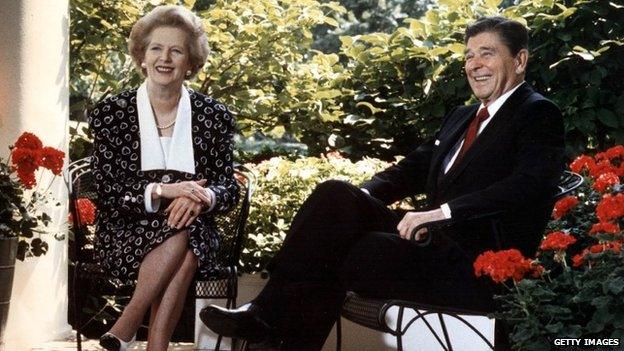
Thatcher sounds brittle and stiff, with just a hint of disdain and haughtiness in her voice. "There's no need to do that," she says sniffily. Yet somehow she seems susceptible to Ronald Reagan's charms. She sounds like a rather strict governess with one of her naughty but charming charges.
His tone is "Oh, gee shucks Margaret, we seem to have accidentally invaded one of your little Commonwealth islands."
While he explains, there is a (nervous?) chuckle in his voice. Who else would have dared a chuckle when Maggie was on the warpath?
And so in the midst of these taut and frosty exchanges, Margaret finds herself asking about Nancy and telling Ron to send the first lady her love.
But then she seems to remember how angry she is and brings the conversation to an abrupt end by saying that she has to rush to the House of Commons for a rather difficult debate.
And how does he end it? He says "Go get 'em, eat them alive!"
Ronald is all bonhomie, and Maggie is all, well, whatever the opposite of "bonhomie" is. To use another French word, she elevates "froideur" to a near art form.
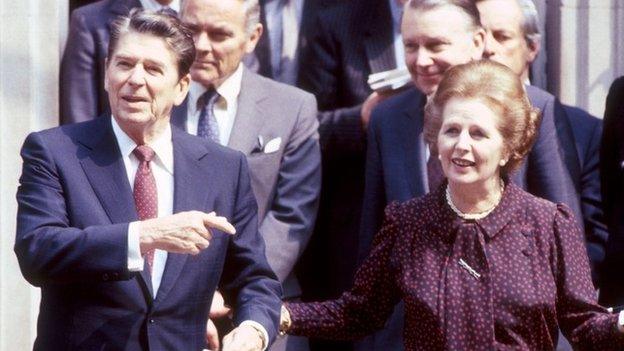
What makes this so fascinating is that in the 1980s, Ron and Maggie formed far and away the most important political relationship of the time.
And for all that people reviled Margaret Thatcher for her coldness, and mocked Reagan for his lack of intellectual depth, the two drove a hawkish agenda which saw the West standing up to the USSR and the rest of the Iron Curtain countries in the belief that with enough pressure the internal contradictions of communism would force political change.
It's not for me here to judge what role they played in the collapse of the Soviet Union, but what these conversations do give us is a unique glimpse of the super-tight relationship between these two very different people, with very different upbringings.
To borrow from the title of a film from the previous decade - what we see in these exchanges is "The Odd Couple".
- Published10 November 2014
